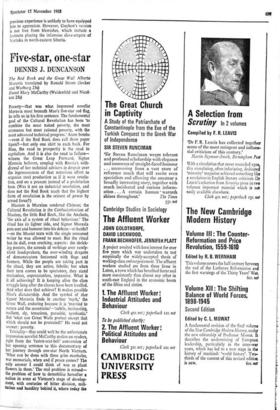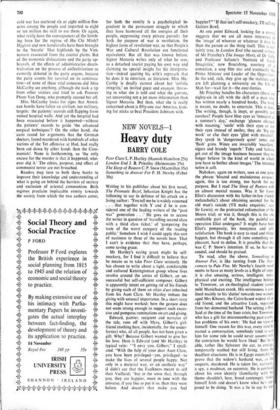Five-star, one-star
DENNIS J. DUNCANSON
The Red Book and the Great Wall Alberto Moravia translated by Ronald Strom (Seeker and Warburg 25s) Hanoi Mary McCarthy (Weidenfeld and Nicol- son 25s)
Poverty—that was what impressed novelist Moravia most beneath Mao's five-star red flag, be tells us in his first sentence. The fundamental goal of the Cultural Revolution has been 'to combine the most naked poverty, the most strenuous but most rational poverty, with the most advanced technical progress.' Atom bombs —even if the Red Book does call them paper
tigers?—but only one shirt to each back. For Mao, the road to prosperity is the road to capitalism. And it is also the road to failure—
witness the Great Leap Forward, Signor Moravia believes, coupled with Russia's with- drawal of her technical advisers in despair over the ingenuousness of that notorious effort to organise steel production as if it were revolu- tion, and on a peasant instead of a proletarian base. (Was it not an industrial revolution, and does not the Red Book teach that the highest form of revolution is the seizure of power by armed force?)
Maoism is Marxism rendered Chinese; the Cultural Revolution is the Confucianisation of Maoism, the little Red Book, like the Analects, 'the axis of a system of ritual behaviour.' The ritual has its lighter side, and Signor Moravia puts zest and humour into his debate—or battle? —on the Maoist texts with the single unnamed writer he was allowed to meet. But the ritual has its dull, even crushing, aspects : the shriek- ing posters, the screeds of verbiage over rarely- silent loudspeakers, the ever-winding dragons of demonstrators festooned with flags and banners. While the people are taking part in the ritual, they are active, febrile; but when their turn comes to be spectators, they stand motionless, expressionless, impassive. What is it all achieving? It is keeping alive the class struggle long after the classes have been levelled. And what does that achieve? It makes possible Mao's dictatorship. And the symbol of that Signor Moravia finds in another 'myth,' the Great Wall, enduring because it is 'married to nature and the mountains'—'subtle, insinuating, resilient, sly, tenacious, parasitic, symbiotic.' But 'what can Great Walls protect except that which should not be protected?' He need not answer: poverty.
Triviality—that could well be the unfortunate impression novelist McCarthy makes on readers, right from the 'fasten-seat-belt' convention of her opening sentence to this documentary of her journey through one-star North Vietnam. 'What can be done with these grim manholes, war memorials, when and if peace comes? The only answer I could think of was to plant flowers in them.' The real problem is missed— the problem of how to demobilise hereafter a nation in arms at Vietnam's stage of develop- ment, with centuries of bitter division, mili- tarism and banditry behind it, where today the
cold war has scattered six or eight million fire- arms among the people and imparted to eight or ten million the skill to use them. Or again, what really have the consequences of the bomb- ing been for the regime of Ho Chi Minh? Hygiene and new handicrafts have been brought to the 'bucolic' Thai highlands by the Viet- namese evacuated from the coastal plains. But of the economic dislocations and the party up- heavals, of the effects of administrative decen- tralisation on the process of collectivisation so earnestly debated in the party organs, because the party counts for survival on its continua- tion—of none of these vital concerns did Miss McCarthy see anything, although she took a tip from other visitors and tried to ask Premier Pham Van Dong, who promptly steered her off.
Miss McCarthy looks for signs that Ameri- can bombs have fallen on civilian, not military, targets: the patients' records still flapping from ruined hospital walls. And yet the hospital had been evacuated before it happened—without the patients' records to guide 'the advanced surgical techniques'? On the other band, she 'casts round for arguments that the German 'doctors, found murdered with hundreds of other victims of the Tet offensive at Hue, had really been cut down by other hands than the Com- munists'. None is forthcoming, so 'the only excuse for the murder is that it happened, who- ever did it.' The ethics, purpose, and effect of 'communist terror are not broached.
Readers may turn to both these books to improve their knowledge and understanding of what is going on behind the barriers of secrecy and exclusion of oriental communism. Both regimes proclaim implacable enmity towards the society from which the two authors come;
for both the enmity is a psychological in- gredient in the permanent struggle to which they have harnessed all the energies of their people, suppressing every private pursuit: for both the purpose of war is revolution, the highest form of revolution war, so that People's War and Cultural Revolution are functional equivalents. But all that was known before. Signor Moravia writes only of what he sees, as a detached tourist paying his own way and claiming no special insight for his interpreta- tion—indeed quoting his wife's reproach that he does it to entertain, as literature. Miss Mc- Carthy is deadly earnest about her 'artistic integrity,' an invited guest and engagge, throw- ing in what she is told and what she guesses, yet uncovering not a jot more information than Signor Moravia. But then, what she is really concerned about is fifty-one star America, look- ing for sticks to beat President Johnson with.







































 Previous page
Previous page